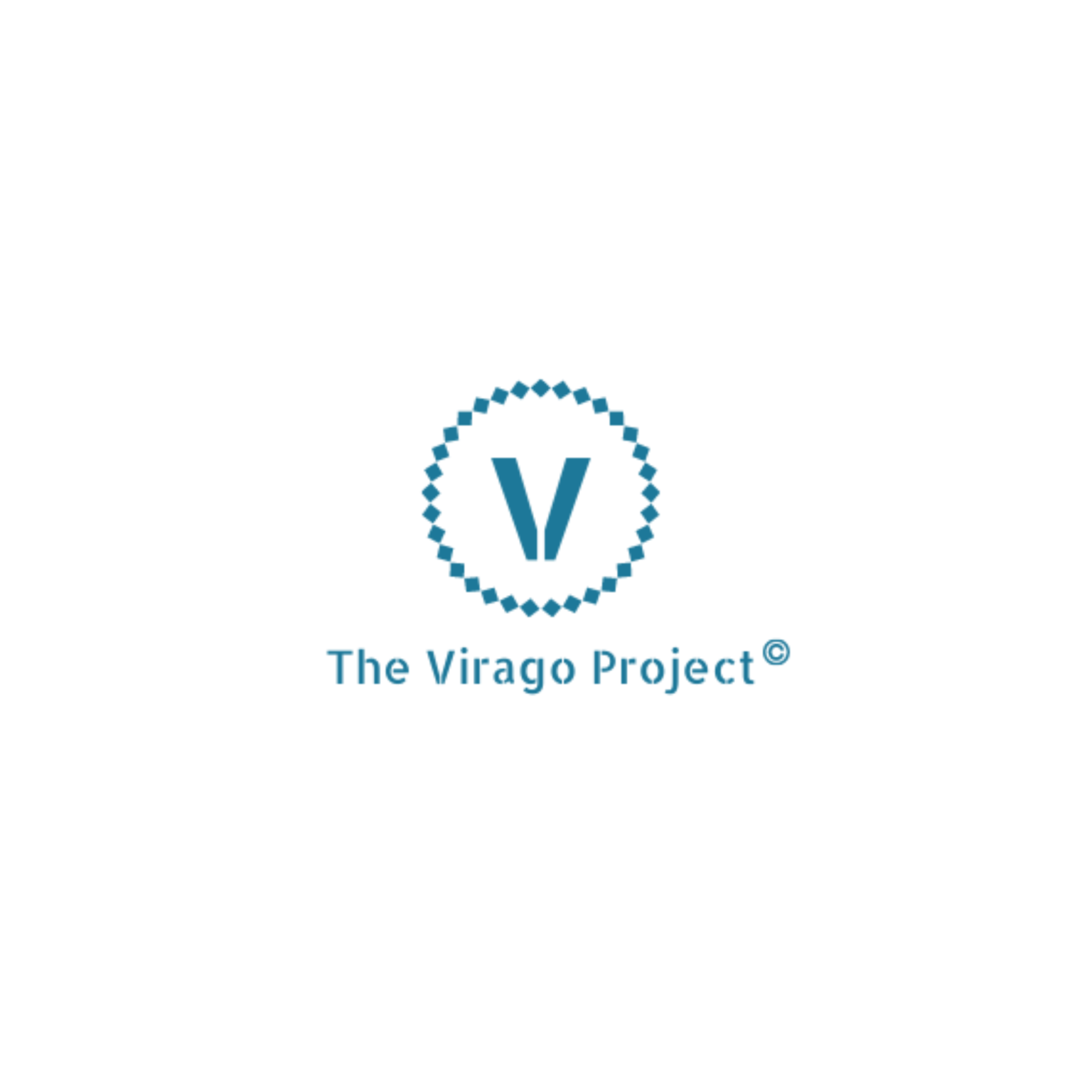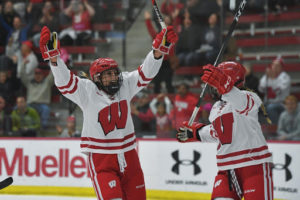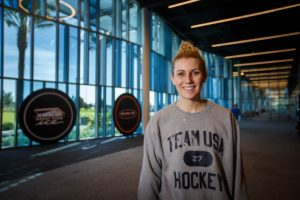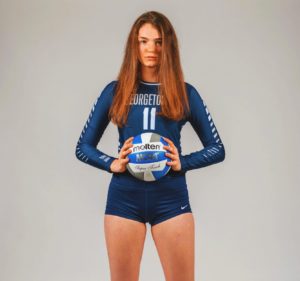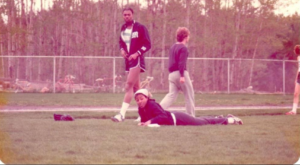by Ellie Greenberg
Annie is an ice hockey player on the United States women’s national ice hockey team, first overall pick in the 2018 NWHL draft, three-time world champion, 2019 national champion with the Wisconsin Badgers, current PWHPA member, and a second-year veterinary student.
When and why did you start playing hockey?
I started playing when I was five years old. While my older brother was playing hockey, I skated around a rink and up to a coach whose team was practicing. He asked, “who are you?” and spoke with my parents about signing me up.
Did you always know that you wanted to be a professional hockey player?
Not really. When I was younger, I enjoyed playing a lot of sports like soccer and softball. I was a really busy kid. It wasn’t until my freshman year in high school, when I first got my first opportunity to represent the United States, that I realized I wanted to play in college and see where it went from there.
What is one memory from your career that you will always remember?
Winning the National Championship at the University of Wisconsin at the end of my senior year. It was a great way to leave an incredible program that impacted my life so much. To have left it with another National Championship is something that I will treasure forever.
What were some challenges that you have met throughout your career?
There’ve been a few challenges. As a senior in high school, I was invited to a national team trial for my first senior team event; I ended up making the pre-Olympic team. At eighteen, I was thrown into the peak of the sport, and I really wasn’t ready, both mentally and physically. I was still young and super green, and I jumped into this environment where there are professional players competing. That was really hard because I wasn’t well equipped mentally and I wasn’t secure enough to reach out and tell someone I was struggling that whole year. I ended up not making the final Olympic team and watched my teammates go on to play. That was really really tough. Then the same thing happened, I missed the final cut four years later in the next Olympic go-round. So those are two huge setbacks in my career, but I’ve learned a lot from each of them.
In time since then, have you learned some skills regarding your mental health and how to ask for help?
Yes. I learned that a lot of people are struggling, and I wasn’t the only one who felt that way. Trying to be brave, I put on a strong face and acted as if everything was fine—but it really wasn’t. I got to a point where I didn’t want to do it by myself anymore.
And once I learned others were also struggling, I was able to reach out to other people and gather other perspectives. I started to think more about what can be done: if it’s the situation making me feel like this, or if it’s my own thoughts that are making me feel that way.
The Virago Project focuses on mental well-being of female athletes. What relationship would you say your mental health has with your sport?
Oh, it’s huge. You can’t even put into words how important it is. Every time you’re competing or practicing, it’s all about how you feel mentally. If you can’t get there mentally to train hard, you’re not going to get anything out of your practice. If you’re too nervous, too scared, too worried about other things, too wrapped up in your own mind when you are set to compete, you’re not going to play your best.
You just end up inhibiting yourself. I think the importance of mental health cannot be overstated enough—especially in women’s sports.
Growing up and throughout your career have there been any female role models or mentors in your life?
As I grew up, my older sister was a huge mentor for me. I wanted to be just like her and just as tough as her. Actually, I wanted to be better than her, so every day that pushed me.
I grew up watching the NHL and wanting to play in the NHL. As I got older, I became aware of female college hockey players, specifically Meghan Duggan, who won the award for NCAA’s best women’s ice hockey player. I wanted to be just like her.
You’re currently a student in the Doctor of Veterinary medicine program at University of Wisconsin. What lessons from sports and from being a female athlete do you carry into your professional practice?
Oh my gosh, there’s so many. Time management is huge—being able to know how to structure my day with lots of self-discipline comes from sports. I’ve learned how to take care of myself both mentally and physically from sports. It translates into life: when I am sitting at my computer studying all day, I know I need to go for a walk to move around, or I need to make sure that I’m drinking enough water, or getting the right nutrition. These are the little things about being a human being that are amplified in sports that sometimes you might not be given access to if you’re only a student your whole life or if you were never asked to question “am I getting enough sleep?” or question “how does my body feel today?” Things like that can definitely have a big impact on my general well-being.
Also, sports have helped me keep up in a professional arena where you’re always trying to learn the next thing. Dealing with insecurity is part of sports, and that helps me in very personal and professional ways.
Can you talk about the women’s hockey national team’s fight for equitable treatment and your involvement in it?
Right now is a pretty messy point in professional women’s hockey in general. So at the moment we’re fighting two separate battles.
The first one is with USA hockey’s general governing body. There we are asking for things that we feel we need to be able to succeed. A big myth about this is that we’re asking for the same payment as men, and that’s not the case. We’re asking for equitable support. This means not flying in the middle seat in row 96 on a transatlantic flight for 7 hours. It’s asking for adequate hotels and meals. Asking for equitable staff to take care of us when we’re away on these trips. These needs have not been met in the past. We want to leave this sport better than we experience it right now. We’re asking that USA hockey fund us throughout all of our training to take care of those little needs that we need to perform at our best.
On the other front, the professional women’s players association is an organization of the best women’s hockey players in North America. We put our brains together to help develop a professional women’s league that is run effectively. In the past, the leagues have not been good enough, lacking in support, payment, and coaching. We are demanding that we have access to fair and equal treatment as professional women’s hockey players. It’s having events that are televised, it’s having events that are properly marketed, and it’s just having the things that we need to build the sport for women.
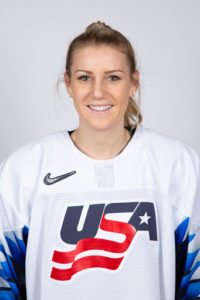
What is your hope for the future of USA Women’s Hockey?
I want it to look like US soccer. I want there to be women’s hockey players that are just women’s hockey players. Specifically, I want to be sustained in my sport and to be really celebrated for reaching the pinnacle of the sport. But that’s not how it is right now. Everyone has other jobs. We’re studying to be veterinarians, we’re working in marketing, we’re working other jobs because just being a professional women’s hockey player is not enough right now. It’s sad because you look at soccer and you see how amazing and inspirational those women are to the next generation. We’re limited in our exposure to the world.
The biggest thing I want to leave behind is that it would be enough to be a professional women’s hockey player because right now it’s not financially sustainable.
